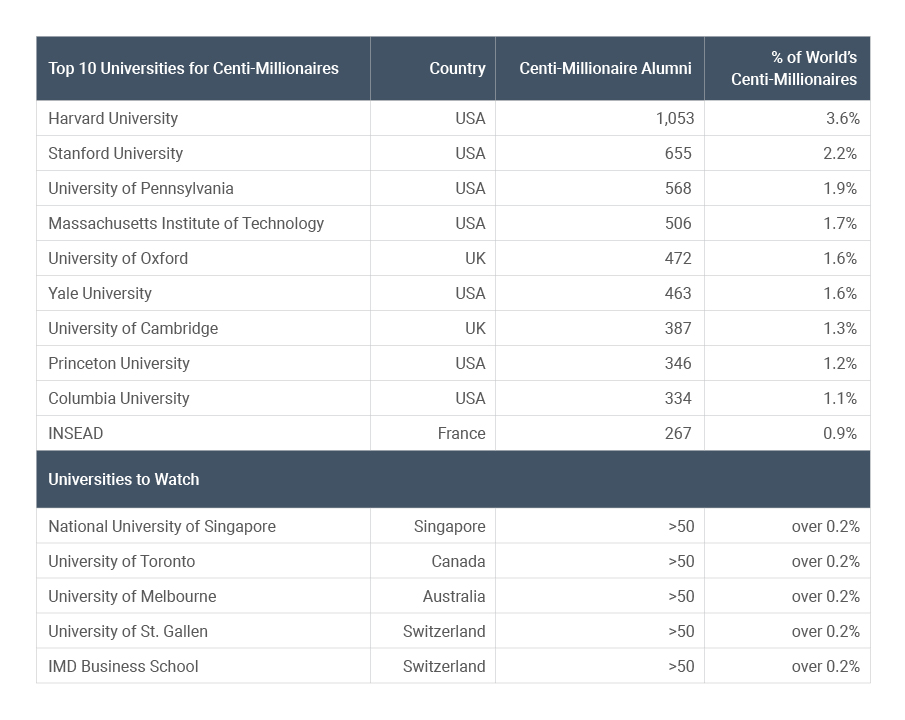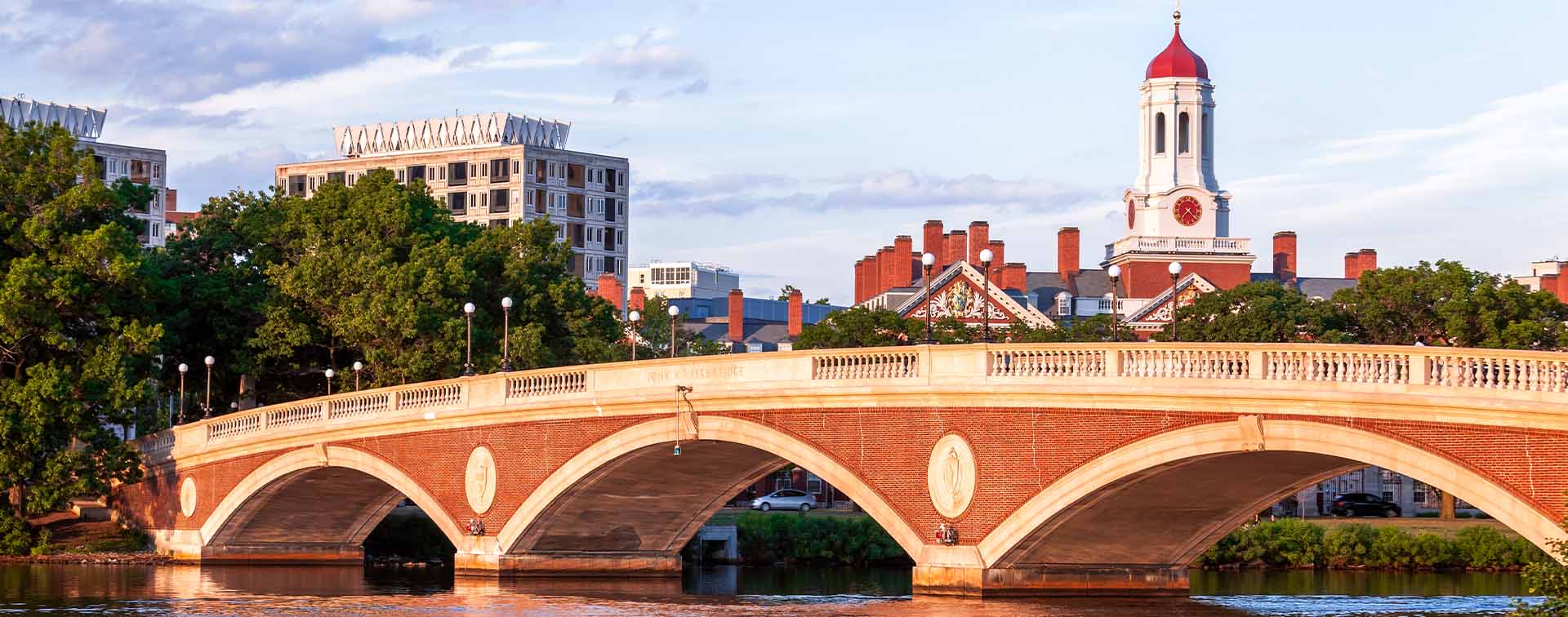
Tess Wilkinson is Director of Education Services at Henley & Partners Education.
The cost of an outstanding education is high, and parents invest small fortunes to give their children the best possible start to their careers, so university outcomes are just as important a consideration as the quality of education. As the Top 10 Universities for Centi-Millionaires data reveals, almost a fifth (17.1%) of the world’s individuals with liquid investable assets of USD 100 million or more were educated at just 10 universities across the globe.
Table 1. Universities with the Most Centi-Millionaire Alumni

Notes:
Source: New World Wealth
Seven of the Top 10 universities in terms of graduates who have gone on to become centi-millionaires, or ‘centis’, are located in the USA. These premium American educational institutions account for 13.3% of the global centi-millionaire population, with Ivy League colleges leading the way. Harvard University ranks 1st having been attended by 3.6% of the world’s centis, Stanford University takes 2nd place with 2.2% of the world’s centi-millionaires among its alumni, and the University of Pennsylvania ranks 3rd with 1.9%.
The other four US universities in the Top 10 are Massachusetts Institute of Technology (MIT), where 1.7% of the world’s centi-millionaires graduated, in 4th place, Yale University 6th with 1.6%, Princeton University ranks 8th, with 1.2%, and Columbia University in 9th place with 1.1%.

The UK’s two Top 10 universities account for 2.9% of the world’s centi-millionaires between them. In 5th place, the University of Oxford has seen 1.6% of the world’s centi-millionaires pass through its halls (the highest in the UK), while the University of Cambridge in 7th place has 1.3% of the global centi-millionaire cohort among its graduates.
France has one university, INSEAD, in the Top 10, with its past students constituting 0.9% of the global centi-millionaire population. The renowned business school’s over 66,000 alumni of 169 nationalities are based in 180 countries and in any MBA intake there are students of 70 nationalities.
In addition to the historically established educational institutions in the Top 10, five universities are showing strong growth potential in terms of the proportion of centi-millionaires who are among their graduates.
Switzerland boasts two — the University of St. Gallen and IMD Business School — jointly accounting for over 0.4% of the world’s centi-millionaires. St. Gallen’s alumni organization has over 42,000 members, while IMD has over 130,000 alumni in more than 180 countries, forming a powerful network.
Three other universities around the globe have been attended by over 0.2% of the world’s centi-millionaire population: the National University of Singapore, the University of Toronto in Canada, and the University of Melbourne in Australia. Among them, they have dozens of successful alumni in various spheres, including multiple Presidents of Singapore, Prime Ministers of Canada, and Governors General of Australia.
Data gathered by Study.eu demonstrated that 36% of the world’s top CEOs have studied abroad, and that 66% have a masters or a doctorate. The value of international education and its impact on earning potential is clear. Examples of this — former US president Bill Clinton is one of Oxford’s most well-known graduates, the late Ghanaian diplomat and former secretary-general of the United Nations, Kofi Annan, studied at MIT, and CEO and President of the LEGO Group, Danish businessman Niels B. Christiansen is one of INSEAD’s success stories.
For global families, the need to consider postgraduate opportunities for their children is key to their fully benefiting from attending exceptional institutions. Ultimately, the possibility of becoming another centi-millionaire after attending one of these prestigious universities may come down to whether or not they are able to continue to live and work in that country.
Without residence rights or citizenship, international students have on average 60 days after graduating before they are required to return to their home countries. While there are initiatives that provide international students who have taken particular degrees with the opportunity to find sponsorship and receive training that may lead to full employment — Optional Practical Training in the USA is an example — this is far from guaranteed.
Competition to secure a place at top universities is intense. Harvard remains by far the most successful in terms of the number of graduates who are centi-millionaires, with 1,053 in 2024. Without doubt, having successful alumni enhances the reputations of and explains the demand for places and rivalry between students applying to these centers of excellence, which is even more intense among foreign students. The admitted class of 2028 saw 54,008 applicants for 1,974 places at Harvard, of which just 16.7% were granted to international students.
By planning in advance, however, parents and grandparents with sufficient means can start the process of acquiring residence or citizenship in education hotspots for their children or grandchildren early to ensure that by the time they attend school or university, they have the right to reside. Countries with excellent education institutions such as Australia, Canada, the UK, and the USA to name a few offer investment migration options for wealthy, talented, and entrepreneurial parents, and rank highly on the Henley Opportunity Index.
Once children are residents or citizens, significantly reduced university fees usually apply compared to those international students are required to pay. Furthermore, acquiring residence or citizenship of another country can transform a child’s future by enabling them to not only study, but subsequently to live and work in an environment where they can access exponentially more opportunities, from the world’s best schooling to the most lucrative job markets and an excellent quality of life.
Take, for example, a South African child attending INSEAD, France’s top centi-millionaire incubator. As a South African citizen, after finishing their studies they would either have to return to South Africa or go through the long process of acquiring appropriate long-term work permits and visas if they were fortunate enough to be considered for employment as a foreigner. The career opportunities and earning potential in South Africa cannot compare to what Europe has to offer. But if their parents applied for the Portugal Golden Residence Permit Program in good time, they would be eligible to apply for citizenship after five years as legal residents, and the child would be able to stay in Europe and work anywhere in the European Union by the time they graduated.
Investing in your child’s education is important, but investing in a residence or citizenship by investment program that also gives them the right to live and work in a country of their choice is the smartest move you can make as it sets them up for a lifetime of opportunity and prosperity that is not limited by their country of birth.